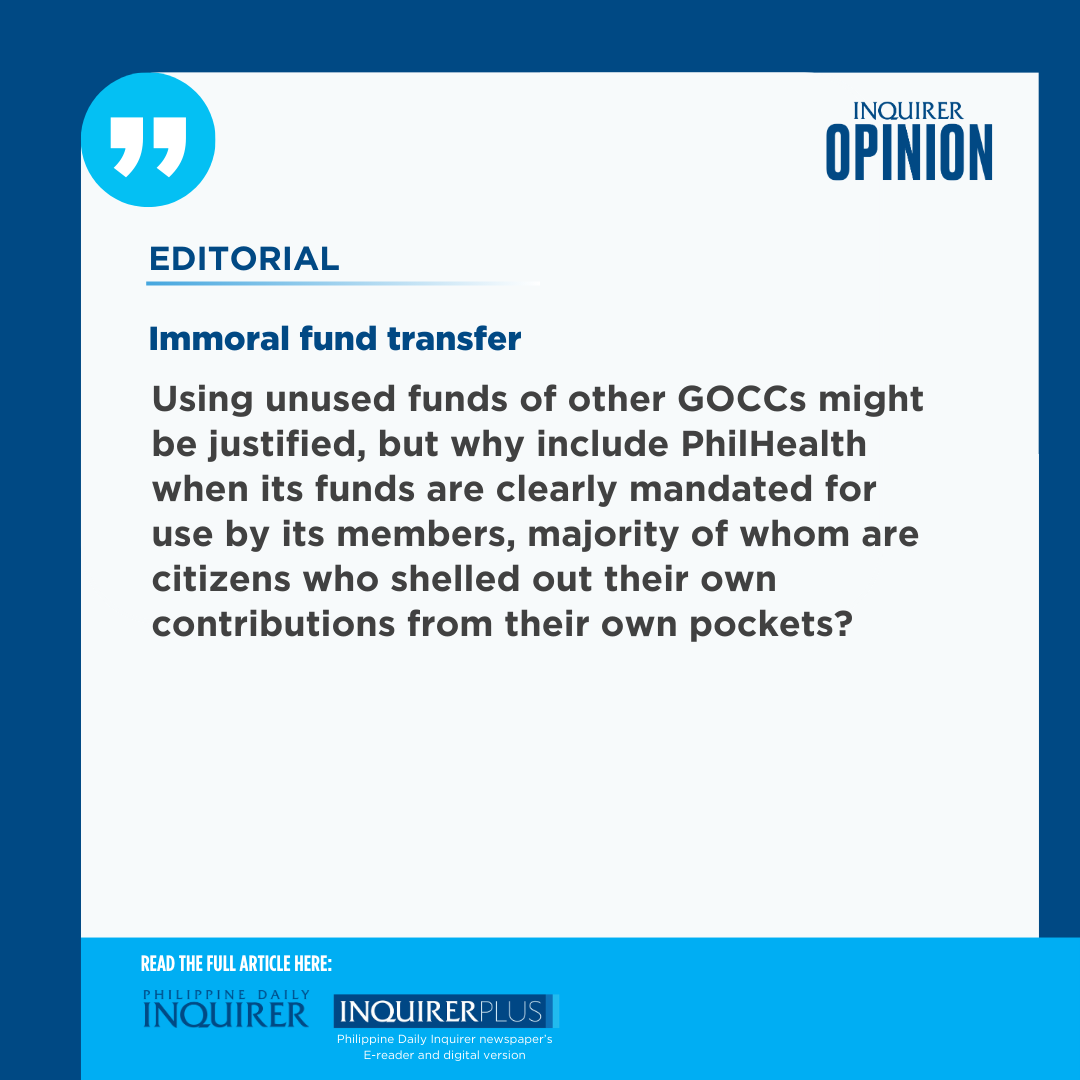Immoral fund transfer
Health sector advocates sounded the alarm last week over the “diversion” of almost P90 billion in Philippine Health Insurance Corp. (PhilHealth) funds to national coffers, claiming that such a move violated several laws requiring that funds be solely used to benefit members, who saw their contributions jump to 5 percent of their monthly income this year from 4 percent.
Dr. Anthony C. Leachon, former special adviser of the Department of Health, emphasized that the return of some P89.9 billion in unused funds of PhilHealth to the national budget “goes against the spirit” of the Universal Health Care (UHC) Act, which specifically provides that excess PhilHealth funds should “be used to increase the program’s benefits and to decrease the amount of members’ contributions.”
The UHC law indeed cannot be any clearer: “No portion of the reserve fund or income thereof shall accrue to the general fund of the National Government or to any of its agencies or instrumentalities.”
And yet, this is precisely what has happened with the transfer of the funds as ordered by the Department of Finance (DOF).
Filomeno Sta. Ana III, executive director and cofounder of local think tank Action for Economic Reforms, shared Leachon’s sentiment and likewise vehemently protested the transfer of PhilHealth funds. At the same time, he blasted PhilHealth management for having substantial unused funds in the first place.
Gross negligence
“PhilHealth leadership must be made accountable for its gross negligence and incompetence for not using PhilHealth’s substantial excess funds to increase the benefits and services for its members and reduce the members’ premium payments,” Sta. Ana stressed.
At the center of the firestorm is Circular No. 003-2024 issued in February this year, in compliance with the controversial provision in the 2024 General Appropriations Act (GAA) that allowed excess funds of government-owned and -controlled corporations (GOCCs) to be returned to the national coffers.
These pooled funds, in turn, can be used for “unprogrammed” projects, or those that do not have a specific line item but can be funded when money becomes available.
According to Leachon, “By stealing [unused funds] away and mixing it in a treasury pool to fund unprogrammed and unbudgeted government expenses unrelated to health care, the current PhilHealth management in effect steals the money of the contributors and fences these to unbudgeted political uses. With due respect to the agency decisionmakers, this is a lack of vision, leadership, and governance system.”
PhilHealth stoutly defended the transfer saying that it was approved by the board in compliance with the 2024 GAA as implemented by the DOF Circular No. 003-2024.
Social justice
The DOF was likewise quick to justify its action, saying that, aside from being true to the GAA 2024, “the national government is in a better position to effectively utilize the unused subsidies for programs that directly and immediately benefit the Filipino people while advancing the goals of Universal Health Care.”
“The merit of this tack is best exemplified by the fact that PhilHealth and other GOCC remittances to the treasury are what enabled the DBM (Department of Budget and Management) to release P27.5 billion to pay the 5.04 million claims of COVID pandemic era service allowances of frontliners,” the DOF said.
The DOF likewise said that using the unused funds of GOCCs for public programs in health, social services, as well as in needed infrastructure was a better option than borrowing even more money or imposing new taxes.
The DOF can indeed cite all sorts of justifications but what may be legal is not exactly moral or appropriate, especially in the face of the 25-percent hike in their contributions this year and the continuing struggle of PhilHealth to expand its benefits, especially the poor who may not directly contribute to the fund but are the prime beneficiaries in the name of social justice.
Poorest of the poor
Using unused funds of other GOCCs might be justified, but why include PhilHealth when its funds are clearly mandated for use by its members, the majority of whom are citizens who shelled out their own contributions from their own pockets? What right has the government to take that away from them and lump them into funds that will be used for other purposes? That is clearly patently illegal.
Using PhilHealth funds to pay the long-delayed COVID-19 benefits of medical frontliners is also not justifiable as it is the obligation of the national government, not of the paying members of PhilHealth.
The Marcos administration can thus do itself a favor and save itself from further criticism by removing that controversial GAA provision in the 2025 version; clearly identifying the high-impact projects it wants to be implemented and the proposed funding for these, and just leaving funds of GOCCs such as PhilHealth alone.
Its members, especially those from the poorest of the poor who depend solely on PhilHealth to help them with their health needs, deserve no less.





















